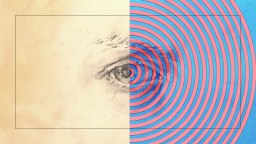Kids in waiting rooms and on transport are kept placid with smartphones and earphones, pressed into their developing canals. Six-month olds already know they need to swipe to unlock an iPhone. Information darts in and disappears just as quickly on smartboards in classrooms. Our attention spans are shot. Our collective impatience is at its historical peak. Will it stunt early development? Is anyone thinking of the children? Well, It’ll be 20 years before we really know the effect that current technology is having on them, but there is no doubt it will change them. This doesn’t cause a swell of anxiety within developmental psychologist Alison Gopnik, because a look through our history as animals reveals that’s exactly how we’ve always operated, and in fact it’s what sets us apart as a species. We use tools, we reshape our physical world, and our inner one. When the printing press and the telegraph were introduced, there were similar dystopian predictions of terrible change – and the world was transformed, certainly, but not for the worse. Our love of stability and familiarity is coming into conflict with the acceleration of technological innovation. Adults worry because it may not be intuitive to them, says Gopnik, but young minds learn differently. There may be trade-offs in the way things have always been but in history, by and large, the benefits outweighed the harms, and they will continue to do so. It’s as human to continually advance as it is to grapple with what is new. Alison Gopnik’s most recent book is The Gardener and the Carpenter: What the New Science of Child Development Tells Us about the Relationship Between Parents and Children
Alison Gopnik’s most recent book is The Gardener and the Carpenter: What the New Science of Child Development Tells Us about the Relationship Between Parents and Children.
Alison Gopnik: So, one of the questions that we're all asking now is what effect are the new technologies, the Internet, computers, cell phones, screens going to have on the next generation of children? The answer is we won't know for another 20 years until those children grow up. But I think we can make some guesses based on our past human history. One of the things about human beings is that we've been technological beings from the very beginning. In fact, in a way that's the thing that's most distinctive about us, we use tools. We modify and change our environments. We create new ways of being in the world, both physically and socially. And that's what we've always done and we've always changed. We've always had culture, which enabled us to take the inventions of one generation and then modify or change them to suit another generation. So the fact that we have technology and the fact that that technology changes and it changes across generations, none of that's new. But curiously part of the effect of that cultural change is it always seems as if the technology that we grew up with his eternal, it's just part of nature; it has always been there. And the technology that our children come up with is part of a dystopian Mad Max future apocalypse. And that's also been true for as long as we've been around as human beings.
So, many of the technologies that you could argue really did have transformative effects on us are things like the printing press, the telegraph, the train. We don't think about a telegraph as being an amazingly disruptive new technology, but when telegraphs and trains were introduced there were just as many editorials in the paper saying these are awful ideas. They're going to reshape our lives in ways that are going to be completely destructive of human happiness. Now in some ways that's right. I mean the printing press really did completely change the way that we relinquish the world and related to each other. The telegraph meant that we went from communicating at the speed of a fast horse to communicating at the speed of light. That made an enormous change in the way that we functioned and related to one another. And I think it's quite plausible that things like the Internet are also going to make a change in the way that we think, the way we relate to one another.
But the assumption that somehow this time it's different, this is going to be the change that's going to destroy our brains or destroy our minds it doesn't really fit our history and it doesn't fit what we know from neuroscience and psychology about the way that childhood is this kind of cauldron of innovation. So one of the reasons why we have this effect, this kind of ratchet, this sense that the technological change in our generation is totally different than any of the others is that there's a big difference between the way we learn with an adult brain and the way we learn with a child's brain. So for adults when they learn a new skill it demands tremendous amounts of attention and energy and working memory. We have to put a lot of work into learning how to do something new. So when I have to figure out how to use my cell phone, for example, it feels effortful. I mean it is effortful and distracting. That's very difficult though from what happens with the skills that we learn when we're in the first couple of years of life, things like learning to speak or even learning to read.
When I walk through a crowded street full of billboards I don't feel as if I'm constantly being distracted because I have to decode what all those letters on all those billboards mean. And that's because I learned to do that at such a young age that it literally just takes place automatically without higher level control. And it seems plausible that that for a new generation children who are interacting with devices from the time their babies with touch and voice that kind of interaction will be as natural and spontaneous for them as reading is for me. Now they'll be different. It won't be the same as reading because interacting with a screen is different from reading. But I don't see any particular reason to believe that that's going to be that terrible evil technology as opposed to all the other technologies.
Socrates famously said that reading was a terrible idea. Books were not a good idea because first of all they would destroy our ability to do things like memorize all the words of Homer, and secondly if you had a book you would think that what was written in the book was true instead of engaging in a Socratic dialogue with the information in the book. And Socrates was right about both of those things. No one nowadays has a memory that's good enough to memorize Homer, and we do tend to think that things in books are true and we can't interrogated them the same way we could in conversation. But overall by and large the benefits outweighed the harms and I think that's going to be true for the new technology that we're grappling with now.







